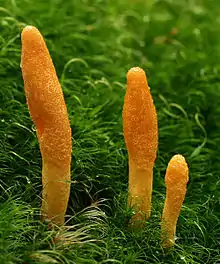Cordycipitaceae
The Cordycipitaceae are a family of parasitic fungi in the Ascomycota, class Sordariomycetes and order Hypocreales. The family was first published in 1969 by mycologist Hanns Kreisel,[1] but the naming was invalid according to the code of International Code of Nomenclature for algae, fungi, and plants. It was validly published in 2007.[2]
| Cordycipitaceae | |
|---|---|
 | |
| Cordyceps militaris | |
| Scientific classification | |
| Domain: | Eukaryota |
| Kingdom: | Fungi |
| Division: | Ascomycota |
| Class: | Sordariomycetes |
| Order: | Hypocreales |
| Family: | Cordycipitaceae Kreisel ex G.H.Sung, J.M.Sung, Hywel-Jones & Spatafora (2007) |
| Type genus | |
| Cordyceps Fr. (1818) | |
Description
Cordycipitaceae species have stromata or subicula that are pallid or brightly pigmented and fleshy. Their perithecia are superficial to completely immersed in the substrate, and oriented at right angles to the surface of the stroma. The asci are cylindrical with a thickened ascus tip. Ascospores are usually cylindrical, contain multiple septa, and disarticulate into part-spores or remain intact at maturity.[2]
Genera
Updated in 2020 to 21 genera; (with amount of species)[3]
- Akanthomyces Lebert (21)
- Amphichorda Fr. (1)
- Ascopolyporus Möller (7)
- Beauveria Vuill. (54) – anamorph
- Beejasamuha Subram. & Chandrash. (1)
- Blackwellomyces Spatafora & Luangsa-ard (2)
- Cordyceps (Fr.) Link (498)
- Coremiopsis Sizova & Suprun (2)
- Engyodontium de Hoog (5) – anamorph
- Evlachovaea
- Flavocillium H. Yu, Y.B. Wang, Y. Wang, Q. Fan & Zhu L. Yang (4)
- Gamszarea Z.F. Zhang & L. Cai (8)
- Gibellula Cavara (29)
- Hevansia Luangsa-ard, Hywel-Jones & Spatafora (8)
- Hyperdermium J.F. White, R.F. Sullivan, Bills & Hywel-Jones (3)
- Jenniferia
- Leptobacillium Zare & W. Gams (1)
- Liangia H. Yu, Y.B. Wang, Y. Wang, Z.H. Chen & Zhu L. Yang (1)
- Neobaryopsis
- Neohyperdermium
- Neotorrubiella Tasan., Thanakitp. & Luangsa-ard
- Parahevansia
- Parengyodontium C.C. Tsang, et al (1)
- Pleurodesmospora
- Pseudogibellula Samson & H.C. Evans (1)
- Samsoniella Mongkols., Noisrip., Thanakitp., Spatafora & Luangsa-ard (3)
- Simplicillium W. Gams & Zare (12) – anamorph
See also
References
- Kreisel H. Grundzüge eines natürlichen Systems der Pilze (in German). Lehre, Germany: J. Cramer. p. 112.
- Sung GH, Hywel-Jones NL, Sung JM, Luangsa-ard JJ, Shrestha B, Spatafora JW (2007). "Phylogenetic classification of Cordyceps and the clavicipitaceous fungi". Studies in Mycology. 57: 5–59. doi:10.3114/sim.2007.57.01. PMC 2104736. PMID 18490993.

- Wijayawardene, Nalin; Hyde, Kevin; Al-Ani, Laith Khalil Tawfeeq; Somayeh, Dolatabadi; Stadler, Marc; Haelewaters, Danny; et al. (2020). "Outline of Fungi and fungus-like taxa". Mycosphere. 11: 1060–1456. doi:10.5943/mycosphere/11/1/8.